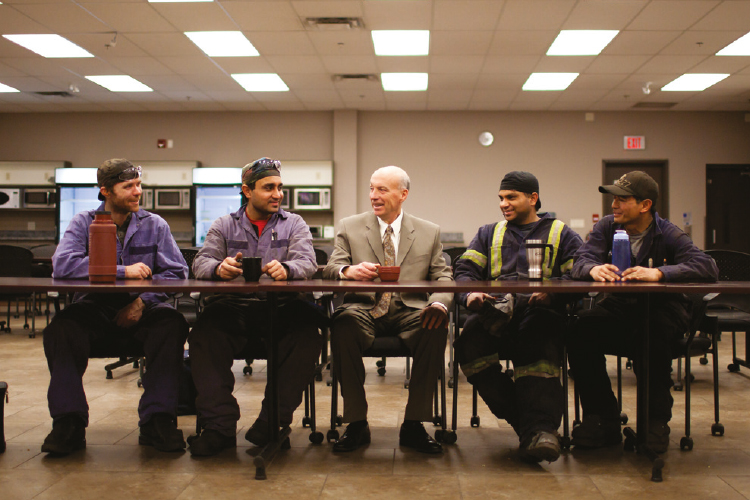We use every available avenue to find and hire Canadians with the right skill set. Simply put there are just not enough skilled trades people in this country to meet the requirements.

| Date Published | September 10, 2012 |
| Company | Plains Fabrication |
| Article Author | Tom McCaffery |
| Article Type | September 2012 Issue |
| Category | Articles, Oil & Gas |
| Tags | Blasting & Painting, Flare Stacks, Hydro Testing, Indirect Fired Heaters, Instrument Tubing, Oilfield HUB Community Sponsor, Pressure Vessels, Skid Packages, Stainless Steel Welding, Structural Steel Fabrication |
| HUB SEARCH | PlainsFabrication |

We use every available avenue to find and hire Canadians with the right skill set. Simply put there are just not enough skilled trades people in this country to meet the requirements.
 It is no longer a secret that Canada has a skilled labour shortage. Our company, Plains Fabrication and Supply, manufactures pressure vessels. We have an excellent staff of 135 people that work long hours to produce the best products we can on time and on budget. We need to satisfy our customer’s requirements, and that often means that a regular working day just won’t suffice. So we fill our day shift, and do the best we can, but then in order to meet the demand we need to fill the night shift which is difficult because there are not enough people that want to work nights. Then we also need to fill swing shifts which are the weekend shifts, and again it is difficult to find people who want to work those hours. We need managers and lead hands to run these shifts. We need safety people and an overabundance of skilled workers to help keep our projects on track.
It is no longer a secret that Canada has a skilled labour shortage. Our company, Plains Fabrication and Supply, manufactures pressure vessels. We have an excellent staff of 135 people that work long hours to produce the best products we can on time and on budget. We need to satisfy our customer’s requirements, and that often means that a regular working day just won’t suffice. So we fill our day shift, and do the best we can, but then in order to meet the demand we need to fill the night shift which is difficult because there are not enough people that want to work nights. Then we also need to fill swing shifts which are the weekend shifts, and again it is difficult to find people who want to work those hours. We need managers and lead hands to run these shifts. We need safety people and an overabundance of skilled workers to help keep our projects on track.
Truth be told we could grow our business if we could find the right people who want to work these hours. We post ad after ad in the paper, online, government websites, and use outside agencies all as a tool to help us find the right people. What we get in return is a few resumes, and most do not have the required skill. So from there we hire the best we can, we train our people, we invest time and sacrifice production so that we can build our staff. We use every available avenue to find and hire Canadians with the right skill set. Simply put there are just not enough skilled trades people in this country to meet the requirements. So we work with schools to promote the trades, we hire directly out of schools, and we bring people from all over the country to help fill the gaps. But even though these new employees may have the “ticket,” they do not have any experience, so while their help is valuable and appreciated, it is limited.
The workers we hire from other provinces require time to get their Alberta certifications so again their help is valued, but it is not an immediate help. In the meantime our excellent staff work harder and harder to fill in the gaps. They miss baseball games, work through the weekend, rack up overtime, and we love them for it. We hold barbeques and try to show our appreciation in as many ways as we can, but we know our responsibility is to provide more help. If we could find the right people we would hire them immediately, but all our efforts to hire Canadian workers have only had minimal results.
We need the government to allow us to try to meet the demand for our products. There are people with the skills that we need in other countries who want to move here because this is a great country full of opportunity.
 When that doesn’t work we need some alternatives. We need the government to allow us to try to meet the demand for our products. There are people with the skills that we need in other countries who want to move here because this is a great country full of opportunity. They will work the same amount of hours, get paid the same wage, and if they work overtime they get paid overtime, they receive the same benefits, and if they do the work and get all the proper certification the Alberta government will extend an invitation for them to stay. It is a fair and mutually beneficial arrangement, and the forward thinking people in the Canadian Government know what a powerful tool this is for industry. This helps our company, it helps our employees, and it helps our country. Please do not be fooled into thinking that we are using this tool as the only solution to an incredibly complex problem, and yes there may be issues, but if you have issues then bring them to the table.
When that doesn’t work we need some alternatives. We need the government to allow us to try to meet the demand for our products. There are people with the skills that we need in other countries who want to move here because this is a great country full of opportunity. They will work the same amount of hours, get paid the same wage, and if they work overtime they get paid overtime, they receive the same benefits, and if they do the work and get all the proper certification the Alberta government will extend an invitation for them to stay. It is a fair and mutually beneficial arrangement, and the forward thinking people in the Canadian Government know what a powerful tool this is for industry. This helps our company, it helps our employees, and it helps our country. Please do not be fooled into thinking that we are using this tool as the only solution to an incredibly complex problem, and yes there may be issues, but if you have issues then bring them to the table.
You may be aware that I have previously written a response to an article in a Calgary newspaper regarding the foreign workers program in Canada. The article was a one-sided attempt to portray Canadian Industry as using foreign workers as a crutch. The article also talked about the foreign worker being “used” and “unable to stay in Canada” after the company who brought the worker in had essentially gotten what it wanted and then returned the worker home.
It was so incredibly untrue that it forced me to respond, and that response has made the rounds through much of the manufacturing industry. I cannot speak for all industry, but I can speak for our company, and I believe that the companies and associations we are affiliated with would agree with much of what we have to say. The basic message is that we want Canadian workers. We want them to help us succeed, be a part of our team, and help us be an efficient and environmentally friendly manufacturer.
Perhaps if people understood the hurdles we have to face, from the employer’s perspective, it would help to add a more rounded view to the grim picture of the labour shortage that has been riddled throughout every newspaper in the country or the past few months.
Businesses, business associations, and the government are getting together in diverse and cutting edge ways to counteract our labour shortage. The issue is that we are not promoting the incredible things we are doing. Hundreds of entrepreneurs are going out of their way to educate themselves in conferences, get together in industry focus groups, and joining associations that are actively working to bridge the gap between where we are today, and where we will need to be tomorrow. In the next two weeks I have 2 government roundtables to attend on foreign workers, Yesterday I was part of a webinar on foreign workers, and by the end of October I will have attended 2 conferences regarding foreign workers.  That doesn’t include association meetings, and internal workings. We are educated, and in constant communication with both industry and the Canadian and Alberta governments. If anyone has concerns then we invite them to the table to talk them through. I think you would be surprised by how much non-billable time and effort Canadian industry spends ensuring our collective industries stay healthy.
That doesn’t include association meetings, and internal workings. We are educated, and in constant communication with both industry and the Canadian and Alberta governments. If anyone has concerns then we invite them to the table to talk them through. I think you would be surprised by how much non-billable time and effort Canadian industry spends ensuring our collective industries stay healthy.